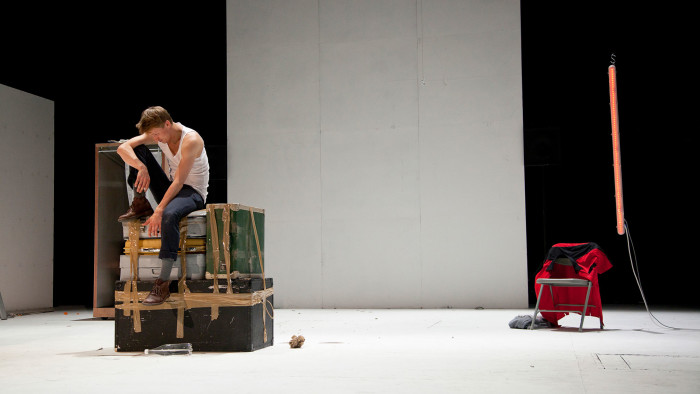Secret Theatre

Simply sign up to the Life & Arts myFT Digest -- delivered directly to your inbox.
Twice this week I have turned up to the theatre with absolutely no idea what play I was about to see. Under normal circumstances, this would be an indication of abject planning on my part. But, on this occasion, it was deliberate: the two shows were examples of Secret Theatre, an innovative programme at the Lyric Theatre in Hammersmith, west London. For the next eight months, an ensemble of 20 (actors, writers, directors and designers) will stage half a dozen plays (some classics, some new dramas), each one presented anonymously under the title Show 1, Show 2 and so on.
The experimental season is born partly out of necessity: the theatre is being expanded, limiting access. But it’s also a response in spirit to the construction work: just as the building is made over, so, too, artistic director Sean Holmes and his ensemble have put on metaphorical hard hats to strip down and reassemble their craft. The anonymity of the plays is part of this: a challenge to the audience to approach the work with an open mind.
In practice, it is invigorating. Arriving at a theatre with no idea of what lies ahead breeds a mix of anticipation and apprehension and, curiously, makes you more receptive. The idea has already sparked debate on social media: when a critic leaked the name of Show 2 on Twitter, opinions for and against the concept raged. The “secrecy” element was important, argued some, encouraging audiences to attend without preconceptions; on the contrary, said others, any good production should make a play feel new.
I’d say the secrecy does tweak your relationship with the work and compel you to go with the flow. It’s possible, too, that, if no one knows what to expect, more conservative audience members might embrace unorthodox work, while those who like innovation could watch a classic text they might otherwise sidestep.
Holmes is sanguine about whether viewers keep mum or not about the shows (Show 2 is named in the next two paragraphs, so skip them if you don’t want to know). “We’re testing every other aspect of how we make and programme work,” he says. “And the secrecy gives people the opportunity, if they want it, to come and see work unmediated by …” he searches for the right word, “froth. But the most important thing is the work.”
His approach is exemplified in Show 2: a staging of Tennessee Williams’ Streetcar Named Desire that rips the play out of its steamy New Orleans setting and delivers it on a bare stage, with the actors using their own accents and playing the drama as if they themselves were embroiled in it. The effect is rather like watching Shakespeare in translation – at once familiar and unfamiliar. It loses something but it gains too: it’s raw and intense, achieving such physical immediacy that when Stanley (Sergo Vares) hacks open a watermelon, it feels immensely threatening. Holmes explains that his aim is not disrespectful, he just wants to look at a classic play afresh using the actors available in his ensemble.
“You’ve got an Estonian as Stanley, a disabled actress [Nadia Albina] as Blanche and a mixed-race actress [Adelle Leonce] as Stella,” he says. “None of those actors in a normal British situation would ever play those parts yet they bring a vulnerability to them which is something to do with the fact that they’re not obvious for those roles. And despite the fact that we’ve removed a lot of the locating framework, the story is very clear. I set out to keep strong British traditions, such as psychologically real acting, motivation and narrative clarity, but break out of a certain sort of literalism, which I was finding increasingly claustrophobic. The play will survive whatever I throw at it. There’s nothing wrong with doing a beautifully realised, faithful production of Streetcar. It just shifts the conversation a little bit.”
After two productions, one fascination is seeing the ensemble developing its own repertory style: a peculiar physical boldness and ease. And Holmes is keen to stress that the season is not a reproach to more conventional theatre but an experiment scrutinising the way theatre is made. As such, it joins other recent initiatives such as the Royal Court’s Open Court season and the work in the National Theatre’s Shed.
“It’s just saying, ‘Can this work?’,” he says. “It’s not about throwing the baby out with the bathwater.”
Secret Theatre, Lyric Hammersmith, London, www.lyric.co.uk
Comments